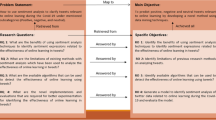Abstract
Deep learning is a subset of machine learning, also known as hierarchical learning. It is based on artificial neural network with various stages of representative transforms. Deep neural networks have been applied in different applications like image processing, speech recognition; market-basket analysis and students’ performance prediction to name a few. Now a day’s education is not limited to only the classroom teaching but it goes beyond that like Online Education System, Web-based Education System, Seminars, Workshops, MOOC courses. It’s a big challenge to extract sentiments from the huge data generated which is stored in the environments of Educational databases. Mining on educational databases can be done to extract the hidden sentiments of the students and their views about the education. Analyzing Students’ sentiments and their learning behavior towards the course, difficulties faced, time spent for the course duration in learning the concepts and worries or fears of students like whether they may pass or fail the Final Exam is of prior importance these days in educational institutes. These factors play a dominant role in reforming education. Tweets are gathered from twitter database and found that the obtained are in unstructured form. Preprocessing methods were applied to clean the data set and later classified tweets based on sentiments into classes namely positive, negative and neutral. In this Paper, sentiments of students are analyzed which can be further considered while making reforms in education. In this paper Educational tweets are extracted from Twitter using twitter API and preprocessed. After Preprocessing, clean data is trained and a Model is attained, on this test data is applied. Results are evaluated on few parameters like Balanced accuracy, Sensitivity and Specificity; Prevalence and Detection rate and found that deep learning technique achieves high performance.
Access this chapter
Tax calculation will be finalised at checkout
Purchases are for personal use only
Similar content being viewed by others
References
A. Merceron, K. Yacef, Educational data mining: a case study, in International Conference on Artificial Intelligence in Education AIED, Amsterdam (IOS Press, 2005), pp. 467–474
I.H. Witten, E. Frank, Data Mining: Practical Machine Learning Tools and Techniques, 2nd edn. Morgan-Kaufmann Series of Data Management Systems (Elsevier, San Francisco, 2005)
S.K. Pal, S.K. Mitra, Multi-layer perceptron, fuzzy sets and classification. IEEE Trans. Neural Netw. 3(5) (1992)
M.M. Quadri, N.V. Kalyankar, Drop out feature of student data for academic performance using decision tree techniques. Glob. J. Comput. Sci. Technol. 10(2) (2010)
N.T.N. Hien, P. Haddawy, A decision support system for evaluating international student applications, in Frontiers in Education Conference-Global Engineering: Knowledge Without Borders, Opportunities Without Passports, FIE’07. 37th Annual (IEEE, 2007), pp. F2A-1
N. Zhong, L. Yuefen, W. Sheng-Tang, Effective pattern discovery for text mining. IEEE Trans. Knowl. Data Eng. 24(1) (2012)
S. Suprajha, C. Yogitha, J. Archita, H.S. Guru Prasad, A study on sentiment analysis using tweeter data. Int. J. Innov. Res. Sci. Technol. 1(9) (2015)
M. Hu, B. Liu, Mining and summarizing customer reviews, in Proceedings of the Tenth ACM SIGKDD International Conference on Knowledge Discovery and Data Mining, Seattle, USA (2004), pp. 168–177
T. Patel, J. Undaiva, A. Patel, Sentiment analysis of parents feedback for educational institutes. Int. J. Innov. Emerg. Res. Eng. 2(3), 75–78 (2015)
G.G. Esparza, A.P. Diaz, J.C. Recih, C.A.D. Luna, J. Ponce, Proposal of a sentiment analysis model in tweets for improvement of the teaching-learning process in the classroom using a corpus of subjectivity. Int. J. Comb. Optim. Probl. Inform. 7(2), 22–34 (2016)
M. Opuszko, J. Ruhland, Classification analysis in complex online social networks using semantic web technologies, in IEEE Computer Society, International Conference on Advances in Social Networks Analysis and Mining (2012), pp. 1032–1039
E. Maleki, A. Rezaei, M.B. Behrouz, Comparison of classification methods based on the type of attributes and sample size. J. Convergence Inf. Technol. 4(3), 94–102 (2009)
M. Hasan, E.A., Rundensteiner, E. Agu, EMOTEX: Detecting Emotions in Twitter Messages (Academy of Science and Engineering, USA, ASE, 2014)
J. Sultana, N. Sultana, K. Yadav, F. Alfayez, Prediction of sentiment analysis on educational data based on deep learning approach, in Proceedings of 21st Saudi Computer Society National Computer Conference (NCC) (2018), p. 1
J. Sultana, M. Usha, M.A.H. Farquad, An efficient deep learning method to predict students performance, in Higher Education Quality Assurance and Enhancement (Rishi Educational Society Book Series, 2018). ISBN 978-81-936838-0-4
J. Sultana, M. Usha, M.A.H. Farquad, Student’s performance prediction using deep learning and data mining methods. Int. J. Recent Technol. Eng. (IJRTE) (1S4), 1018–1021 (2019). ISSN: 2277-3878 (Blue Eyes Intelligence Engineering & Sciences Publication)
J. Sultana, M. Usha, M.A.H. Farquad, An extensive survey on some deep learning applications, in Emerging Research in Data Engineering Systems and Computer Communications. Advances in Intelligent Systems and Computing Series, vol. 1054. Proceedings of CCODE (2019), 978-981-15-0134-0
W.H. Delashmit, T. Michael, Recent developments in multilayer perceptron neural networks, in Proceedings of the 7th Annual Memphis Area Engineering and Science Conference, MAESC, vol. 699
J.R. Quinlan, C4.5 Programs for Machine Learning (Morgan Kaufmann, 1993)
R. Kohavi, Scaling up the accuracy of Naïve-Bayes classifiers: a decision tree hybrid, in Proceedings of KDD-96, Portland, USA (1996), pp. 202–207
V.N. Vapnik, The Nature of Statistical Learning Theory, 2nd edn. (Springer, New York, 1998)
Author information
Authors and Affiliations
Corresponding author
Editor information
Editors and Affiliations
Rights and permissions
Copyright information
© 2020 Springer Nature Switzerland AG
About this paper
Cite this paper
Sultana, J., Usha Rani, M., Farquad, M.A.H. (2020). Deep Learning Based Recommender System Using Sentiment Analysis to Reform Indian Education. In: Jyothi, S., Mamatha, D., Satapathy, S., Raju, K., Favorskaya, M. (eds) Advances in Computational and Bio-Engineering. CBE 2019. Learning and Analytics in Intelligent Systems, vol 15. Springer, Cham. https://doi.org/10.1007/978-3-030-46939-9_13
Download citation
DOI: https://doi.org/10.1007/978-3-030-46939-9_13
Published:
Publisher Name: Springer, Cham
Print ISBN: 978-3-030-46938-2
Online ISBN: 978-3-030-46939-9
eBook Packages: Mathematics and StatisticsMathematics and Statistics (R0)




